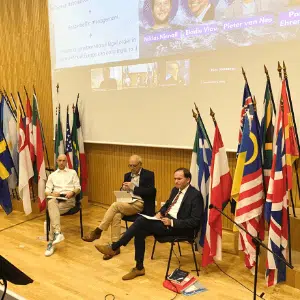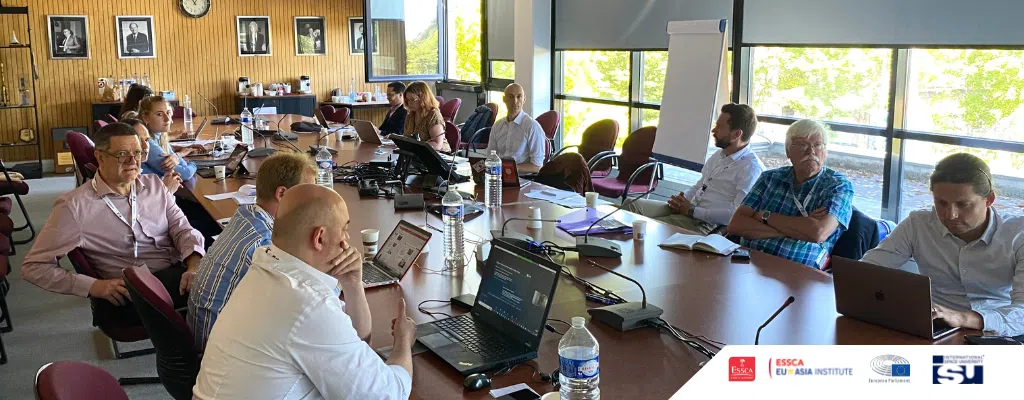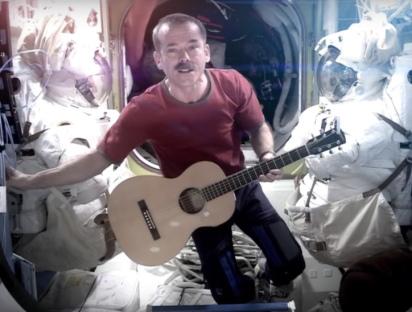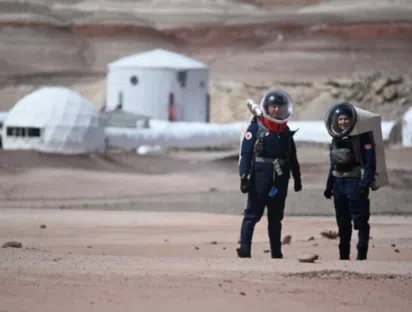From 8 to 10 June 22, our Institute was the guest of the International Space University in Strasbourg for a first successful collaboration between the ISU and ESSCA, which will open a campus in Strasbourg in September 2022.
This event was also an opportunity to deepen the relationship between the Institute and MEP Niklas Nienass (The Greens/EFA), whose work topics include space policy.

During the subsequent two-day academic workshop entitled ‘Visions for Space – new ideas, new horizons and the final frontier’, 21 researchers and practitioners shared their expertise on the common theme of space policy, further developed their work and ideas, discussed concepts, and identified future cooperation projects.
One of the main conclusions of this workshop was the desire to have a greater impact on policymakers through the research work done. Some future projects could emerge from this common will.
As a first step, the summary of the workshop on the ‘Role of States in International Relations’ below will give you an overview of the workshop from a perspective that combines research and recommendations for policymakers.
Policy Brief: The Role of States in International Relations
14th ESSCA Space Policy Workshop: Visions for Space – new ideas, new horizons, and the final frontier
Andrew Thomas The Amateur Satellite Service.
– Defining clear boundaries between the democratisation of space allowed by accessible commercial products/services (i.e. Amateur Satellite Service) and pollution of space by debris, ideally reaching international agreement on this issue.
Antonella Forganni Hard Law and Soft Law for a Sustainable Space Policy?
– Renewing international space law by reaching official agreements among states, and addressing the insufficient consideration given to private entities involved in space activity. – If no legal agreement can be reached, the creation of guidelines to set practices could be an alternative, although the lack of coercion or global cooperation may prevent the initial problem from being resolved.
Benjamin Pothier Digital analogues: how science fiction impacts analogue astronaut missions
– Addressing counterproductive biases induced by science fiction on analogue astronaut missions: promoting harmony among participants, and fidelity of the psychological framework during missions.
Bruno Reynaud de Sousa Transatlantic Cooperation for Commercial Space Activities: on the possibility of leveraging existing EU-US dialogue structures.
– Leveraging current transatlantic economic dynamics to bring EU-US cooperation on commercial space into a new stage. – Expanding EU-US cooperation regarding space ‘beyond common programs and scientific cooperation’. This could be allowed by policy measures promoting multi-stakeholder transatlantic dialogue.
Christina Giannopapa The evolving role of the European Union Space Programme Agency in safety and security for Europe.
– Relying on EUSPA programmes and activities to reach goals of strategic autonomy and the non-dependence of Europe in space.
Elisabetta Lamboglia and Andrea Vena ESA strategy for overcoming climate and sustainability challenges.
– Enabling ESA to become a global leader on sustainable development as a space-related organisation. – Encouraging collaboration among states, international institutions (e.g. the European Commission), private actors and ESA to create an impact and develop a pioneer role related to global environmental issues.
Gabriel Weber and Thomas Hoerber The Ecological Economics and Corporate Social Irresponsibility of Private Spaceflight Companies.
– Assessing the full extent of the social irresponsibility of private spaceflight in its inclination to replace natural capital with man-made capital (e.g. resource extraction, safety standards, exploitation of employees). – Recognising the commodification of space as evidence of structural environmental degradation resulting from global capitalist expansion.
Giulia Pavesi Regulating Space Traffic Management: an inclusive approach for an exclusive environment.
– Strengthening regulatory consistency and interoperability of space traffic management frameworks for more reliable collision avoidance. – Achieving ‘space domain awareness against kinetic and non-kinetic threats’. – Reinterpreting and updating the corpus juris spatialis.
Harald Köpping Athanasopoulos EUtopia vs. Dystopia: Space 4.0 and Space in Film since 2010.
– Cultivating an optimistic vision of space for the general population: beyond the existing doubts reflected in popular culture; communicating on the future of space as an inspiration and a positive vision that could unite citizens and strengthen their trust in the EU and its projects.
Helen Kavvadia Will the European Investment Bank propel EU space activity?
– Encouraging investment in the space sector in order to avoid a risk of capital shortage in the wider European market. These initiatives could be supported by the European Investment Bank (EIB) through ex-ante coordination mechanisms and the sharing of best practices.
João Marques de Azevedo The Principle of Common Heritage of Humankind in the Law of Outer Space.
– Increasing the legal certainty of the principles concerning activities related to space resources, by reaching internationally-agreed understanding. – Implementing adaptive policy and governance for space resources, rather than legally binding frameworks for now.
João Nuno Frazão and João Marques de Azevedo The Strategic, Political and Legal Evolution of Space Activities in Portugal.
– Taking advantage of international cooperation regarding science and technologies to ‘foster the development of satellite data’, strongly supported by innovative national infrastructures and technologies. – Leveraging international cooperation in space to strengthen broader international relations with diplomatic and scientific partners.
Leonardo Jaminola III and Angelika Lourdes Pizarro Examining the Implementation of the 21 Guidelines in the Philippines: Status, Challenges, and Prospects.
– Implementing nationally, in a timely and effective manner, the 21 guidelines on the Long-term Sustainability of Space Activities (LTS) of the UN Committee on the Peaceful Uses of Outer Space (COPUOS) in all states. – Reporting to COPUOS on the status of state implementation of the LTS Guidelines for enhanced coordination and cooperation.
Lorna Ryan Sustainability in Space.
– Agreeing on a precise definition of sustainability for the space sector, directly linked to the recognition of a dominant socio-technical imaginary that could be an integral part of policy actions at national and European levels. – Providing a voice for the EU in defining international standards and guidelines for sustainability and safety in space (e.g. space traffic management). European industries would benefit in the short and long term from this opportunity for action.
Nicolas Peter The space debris challenge to the sustainability of the space economy.
– Growing threat paused by space debris to the space assets. Characterizing more precisely the near space environment for improved monitoring is needed. – States should invest swiftly in R&D and early development of debris removal-related businesses to reduce its costs and improve its reliability, which is only possible in the long term if massive investments are made first. Necessity to develop appropriate policy and legal actions to complement technical actions.
Nikola Schmidt The multilateral model for Planetary Defence Governance.
– Implementing multilateralism for a global defence mechanism: formalising global governance of global defence by uniting national security agendas, thus respecting national sovereignties for better acceptance by governments. – Providing a platform for scientific cooperation on an international scale with funding from national security funds. – SMPAG scientific community, as an established platform, would be a base on which to build a planetary defence security community.
Nina Klimburg-Witjes Making the Ariane Rocket: Sociotechnical Visions of European Space Futures.
– Developing imaginaries of strategic autonomy: fostering the emergence of a common and stable ideal for European space future; encompassing national preferences, and uniting member states ‘behind a broader political and economic aim’ (while addressing issues coming from competition among EU members). – Embracing the geopolitical shift of the EU by developing its own ‘language of power’ to face all the other international actors.
Sarah Lieberman New pictures in old frames: how can states develop new space policy within the outdated framework of the international regime for space?
– Regulating private companies operating within one’s borders, ensuring that they comply with international space law and principles. – Encouraging cooperation among government agencies and the private commercial sector. This could be effective in synchronising private activities with global space policy. – Involving multinational companies more in the development of space legislation.
Veronica La Regina Democratisation of Space: access, exploitation and participation.
– Revising or reinterpreting states’ international treaties on space since they do not suit the current situation regarding private actors across the globe.
The programme of this workshop is available here.





